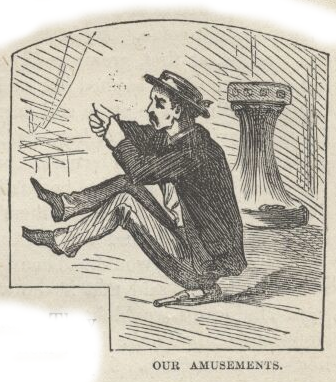After half a year’s luxurious vagrancy in the islands, I took shipping in a sailing vessel, and regretfully returned to San Francisco—a voyage in every way delightful, but without an incident: unless lying two long weeks in a dead calm, eighteen hundred miles from the nearest land, may rank as an incident. Schools of whales grew so tame that day after day they played about the ship among the porpoises and the sharks without the least apparent fear of us, and we pelted them with empty bottles for lack of better sport. Twenty-four hours afterward these bottles would be still lying on the glassy water under our noses, showing that the ship had not moved out of her place in all that time. The calm was absolutely breathless, and the surface of the sea absolutely without a wrinkle. For a whole day and part of a night we lay so close to another ship that had drifted to our vicinity, that we carried on conversations with her passengers, introduced each other by name, and became pretty intimately acquainted with people we had never heard of before, and have never heard of since. This was the only vessel we saw during the whole lonely voyage.
 We had fifteen passengers, and to show how hard pressed they were at last for occupation and amusement, I will mention that the gentlemen gave a good part of their time every day, during the calm, to trying to sit on an empty champagne bottle (lying on its side), and thread a needle without touching their heels to the deck, or falling over; and the ladies sat in the shade of the mainsail, and watched the enterprise with absorbing interest. We were at sea five Sundays; and yet, but for the almanac, we never would have known but that all the other days were Sundays too.
We had fifteen passengers, and to show how hard pressed they were at last for occupation and amusement, I will mention that the gentlemen gave a good part of their time every day, during the calm, to trying to sit on an empty champagne bottle (lying on its side), and thread a needle without touching their heels to the deck, or falling over; and the ladies sat in the shade of the mainsail, and watched the enterprise with absorbing interest. We were at sea five Sundays; and yet, but for the almanac, we never would have known but that all the other days were Sundays too.
After half a year’s luxurious vagrancy in the Islands, I . . . returned to San Francisco] Clemens left Honolulu aboard the Smyrniote on 19 July and arrived in San Francisco on 13 August. His Sandwich Islands trip, including the voyages there and back, lasted a little more than five months (“Passengers,” Honolulu Pacific Commercial Advertiser, 21 July 66, 2).
"Chapter 78" in Roughing It : an electronic text. 2016
From Page 344, The Life of Mark Twain: The Early Years, 1835-1871:
While the outbound voyage on the Ajax had required only ten days, the trip back to San Francisco required twenty-five days because of sporadic calm seas and adverse winds. It was the longest ocean voyage of Sam's life. The Smyrniote only sailed 110 miles the first day, and they were “only 10 miles from Oahu, having gone clear around the island,” though the next day the ship “made 179 miles,” By July 25, seven days out, Sam noted in his journal, “we are abreast of San Francisco, but seventeen hundred miles at sea!—when will the wind change?” On July 30 he observed that it was “the fifth day of dead, almost motionless, calm—a man can walk a crack in the deck, the ship lies so still.” At dawn on August 5, Sam spied the Comet on the horizon, and three days later, 800 miles west of San Francisco, he noted that “the calm is over & we have got a strong breeze. This sort of Life on the Ocean Wave will do—the ship is flying like a bird— she tears the sea into seething foam—& yet the ocean is quiet & sunny— so steady is the ship that I could walk a crack.” The passengers aboard the Smyrniote did not see the Comet again until the morning of August 13 as both ships entered the Golden Gate about 300 yards apart. “Home again," Sam noted in his journal. “No—not home again—in prison again—and all the wild sense of freedom gone. The city seems so cramped, & so dreary with toil & care & business anxiety. God help me, I wish I were at sea again!” The editors of the San Francisco Dramatic Chronicle welcomed him back by facetiously nominating him for chief of police, “subject to the ratification of the present police force.””
There must be an easier way to make a living, Mark Twain Takes to the Boards